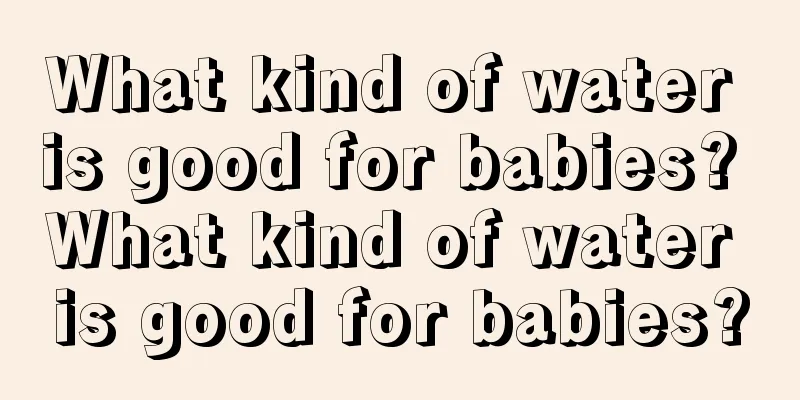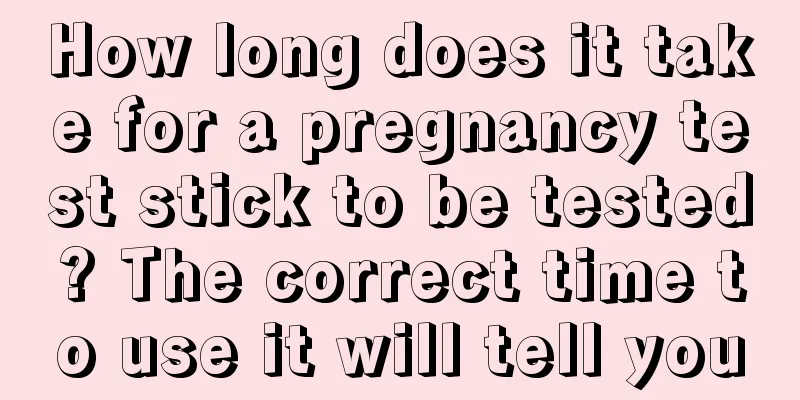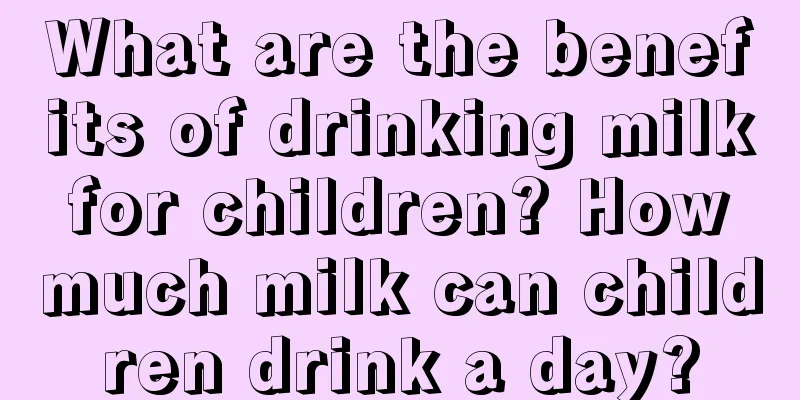What kind of water is good for babies? What kind of water is good for babies?

|
What kind of water is good for babies to drink? Which kind of water is good for babies? Today I will introduce to you the water that is suitable for babies to drink. Which one is better? Parents who want to know what kind of water is more suitable for babies to drink can refer to the detailed introduction below. Which kind of water is more suitable for babies to drink. What kind of water is good for babies?1. Boiled water with good water quality is economical and affordable. Boiled water is the most economical and most easily available drinking water for infants and young children. If the tap water source in your area is in good condition and the water treatment technology is relatively complete, boiled water can promote metabolism, transport nutrients, clean internal organs, promote diuresis and defecation, and enhance the body's immunity. Boiled water kills pathogenic microorganisms during the boiling process and retains minerals such as calcium, magnesium, and phosphorus, which has a positive effect on the growth and development of babies. 2. Purified water cannot be drunk frequently. Purified water that has undergone secondary processing is not suitable for children's digestive system. Because the mineral content of purified water is too low, it will cause a large concentration difference between the inside and outside of cells, leading to absorption disorders. In addition, while purified water filters out some toxic substances, it also filters out the macro and trace elements required for the growth and development of babies. Long-term drinking of purified water may cause the deficiency of macro and trace elements in the baby's body. 3. Baby-specific water is more complete. In my country, the domestic tap water quality standards have a relatively wide range of indicators for mineral content, which are not designed for infants and young children. In addition, the tap water quality in different regions is also different. Parents who have the conditions can choose baby-specific water that is slightly more scientific when feeding their babies. First of all, the mineral content of baby-specific water, such as sodium, magnesium, calcium, fluoride, manganese, sulfate, nitrate, etc., is relatively balanced, within the national standards, and moderately meets the nutritional needs and metabolism of infants and young children; at the same time, the commercial sterile (meaning that the product does not contain pathogenic microorganisms, nor does it contain non-pathogenic microorganisms that can reproduce in it at normal temperatures) production standards can be directly used by babies without worrying about affecting the baby's sensitive and fragile stomach. Symptoms of dehydration in babiesIf your baby is not getting enough water, the body will show many warning signs: 1. Within 24 hours, the baby has less than 6 wet diapers, or the diaper is not wet within 6 hours. 2. The urine is dark yellow and has a strong odor. 3. The fontanelle of the head is sunken. 4. The younger baby has dry lips, and the older baby complains of thirst. 5. Skin elasticity deteriorates. The mother pinches the skin on the back of the baby's hand with her thumb and index finger, and then lets go suddenly. You can see the skin returning to its normal shape. When the baby shows the above warning signs, the mother may think of replenishing water, but at this time the water balance in the baby's body has been broken, the cells begin to dehydrate, and the health has been damaged. Therefore, the correct measure should be to replenish water according to the baby's physiological needs before the baby shows any signs of dehydration. What kind of water is good for babies?Three common mistakes in drinking water 1) Drinking purified water The purified water currently on the market has effectively removed inorganic substances such as calcium, magnesium, iron, manganese, zinc, and silicon. Therefore, purified water is basically free of pollutants and nutrients. Some of the minerals (trace elements and macro elements) required for the growth and development of infants and young children are obtained from water. Long-term drinking of purified water will reduce the intake of minerals and beneficial elements by infants and young children, especially those trace elements that cannot be taken in or are taken in very small amounts in daily diet, such as fluorine, strontium, zinc, etc., which will have an adverse effect on health. In addition, the pH value of purified water is generally around 6.0, while my country's drinking water hygiene standards stipulate that the pH value is 6.5-8.5. Infants and young children are generally not suitable for long-term drinking. 2) Choose mineral water or mineral water without checking the ingredients Natural groundwater that contains certain trace elements is called mineral water. However, each mineral water may contain different trace elements, so the minerals contained in the mineral water you give your child may not be what the child needs for growth and development. In fact, drinking this mineral water may cause an excess of certain trace elements and inhibit the absorption of other minerals, which may be harmful to the child in the long run. Therefore, when choosing mineral water, you should check whether the minerals contained in it are what your child lacks. 3) Replace water with beverages and juices Because the breast milk or formula milk that children eat from birth have a certain sweetness, their taste buds have a strong affinity for sweetness. Once parents give their children juice or drinks for some reason, the child's taste memory warehouse will come into play. Therefore, some children refuse to drink water and prefer juice or drinks. Beverages contain a lot of sugar. Carbonated drinks contain 5% to 8% sugar, and yogurt drinks contain 10% to 13% sugar. Long-term consumption will cause children to consume too much sugar and become "little fat kids". Industrially produced juices, including freshly squeezed juices at home, provide children with the nutrients necessary for their physical health, including fructose, minerals, organic enzymes, carotene, protein and vitamins. Long-term drinking is also good for children's health. However, any food should not be consumed in excess. Juice is also a "double-edged sword". Excessive drinking can also have the opposite effect. If you drink juice frequently and in large quantities, because it contains a lot of fructose, your child's blood sugar will rise, which can affect appetite, lead to malnutrition, and affect normal growth and development. At the same time, excessive fructose will affect the body's absorption of copper. |
>>: What to eat during pregnancy? Healthy pregnancy 3 stages recipes
Recommend
What to do if your baby won't eat the bottle? What to do if your baby won't eat the bottle?
Many mothers who have been breastfeeding for a lo...
What should I do if my child's earwax becomes hard? Is it harmful if my child's earwax becomes hard?
What should we do when children's earwax beco...
How much does an oxytocin injection cost? Does an oxytocin injection have any side effects?
After waiting for so long for the baby to come ou...
What is the reason for postpartum bleeding during intercourse? What should I do if I feel pain during intercourse after delivery?
Many postpartum mothers will experience bleeding ...
How many days does it take for a newborn to be one month old? ...
After a baby is born, people often ask if it is o...
Will ultrasound harm the baby? Listen to the doctor and there will be no danger
Every pregnant mother knows that during the prena...
How many days does it take for IVF to implant? The specific process of IVF
IVF is a life-saving straw for infertile couples....
Can children drink purified water? Can children drink soda water?
In our daily life, in addition to boiled water, w...
Is it because the baby is hot when his head sweats while sleeping? What is the reason for the baby's head sweating while sleeping?
Some mothers are confused. The weather is not hot...
Is it normal to have more vaginal discharge before giving birth?
Before giving birth, the mother's vaginal dis...
Can newborns have their nails cut? What should I do if my newborn's nails are cut on the flesh?
Cutting nails is a very common thing. We all know...
What are the dangers of babies loving sweets? What can they eat instead?
Does your baby like to eat sweets? Eating too muc...
Which is better, breast milk or formula? The most important thing is that the mother is happy
Whether to give the baby breast milk or formula m...
Can baby toothpaste be eaten? The correct way to brush your baby's teeth
When the baby's teeth grow out, mothers will ...
Will babies get constipated if they eat rice cereal? Will babies get constipated if they eat rice cereal?
In the early stage of adding complementary food, ...









